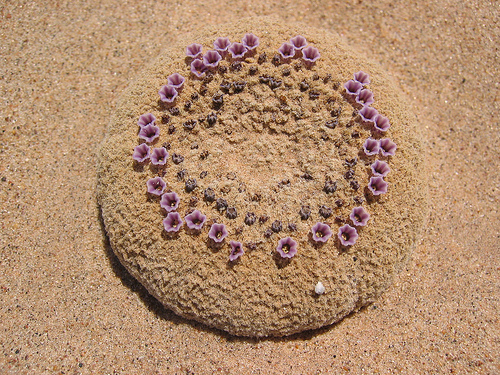Sand food looks like something from the beach rather than from the desert!
- Sand food is a species of flowering herb found in deserts of the south-western area of the United States.
- The scientific name of sand food is Pholisma sonorae and it is from the family Boraginaceae, the family of borages.
- Sand food is found on sand dunes, and has a single scaly stem that can grow up to 1.8 metres (6 feet) underground.
- Sand food has a brown, grey or cream coloured, roundish head with a diameter of up to 12.7 cm (5 inches), shaped like a mushroom, that sits above the sand.
- To obtain moisture and nutrients, sand food plants use their long underground stem to take in water from the surrounding area, and attach themselves to another plant’s roots to absorb some of the host plant’s nutrients, like a parasite.
Sandfood
Image courtesy of Pacific Southwest Region/Flickr
- The small flowers of the sand food plant often sit in a circle on the top of the head, and they are purple to violet in colour.
- Sand food heads are generally partially concealed by sand, however when the sand is moved from around the plant, the stem and head combination is visually similar to a mushroom.
- Exactly how sand food seeds are distributed is uncertain; however it is likely that the ever-shifting nature of sand, or insects or small mammals, bring the seeds deep under the sand.
- Sand food flowers bloom in the months from April to June, and are covered in hairs that effectively reduce the effects of the heat of the sun.
- Historically, the stems of sand food plants have been consumed by Native Americans, either cooked, or eaten raw; and as of 2012, they were an ‘at risk’ plant, mainly due to habitat disturbance by vehicles and habitat loss.





